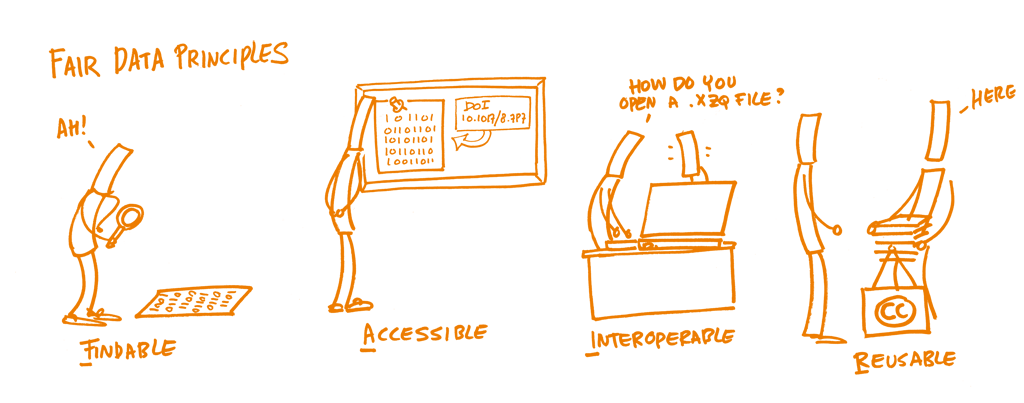Open Research Data and Materials
Created by Alex Lorson and Bonan Zhao on Sept 4, 2021
Table of contents
Open research data is data that can be freely accessed, reused, remixed and redistributed. Ideally, open data have no restrictions on reuse or redistribution, and are appropriately licensed as such. However, to protect the identity of human subjects, special or limited restrictions of access should be set with care.
Openly sharing data exposes it to inspection, forming the basis for research verification and reproducibility, and opens up a pathway to wider collaboration. In order to make findings/studies replicable, or at least reproducible or reusable in any other way, the best practice recommendation for research data is to be as open and FAIR as possible:  The FAIR principles put a specific emphasis on enhancing the ability of machines to automatically find and use data or any digital object, in addition to supporting its reuse by individuals.
The FAIR principles put a specific emphasis on enhancing the ability of machines to automatically find and use data or any digital object, in addition to supporting its reuse by individuals.
Data packaging
- Containers for describing and sharing accompanying data files, and typically comprise a metadata file describing the features and context of a dataset, e.g. creation information, provenance, size, format type, field definitions, as well as any relevant contextual files, such as data creation scripts or textual documentation
- Data outlive their original purpose and be taken out of their original context (library catalog) so the context has to be documented.
- Document how the data was gathered. If this information is described in an associated research article, make sure that all the necessary information is given in the article.
- Structuring metadata about datasets in a standard, machine-readable way encourages the promotion, shareability, and reuse of data.
Data publishing
- Supplemental material associated with a research article, typically with the data files hosted by the publisher of the article.
- Hosting data on a publicly-available website, with files available for download (OSF)
- Depositing data in a repository that has been developed to support data publication, e.g., Dataverse
- Institutional research data repository, or your research group’s established data management facilities.
Data citation
- Data citation services help research communities discover, identify, and cite research data (and often other research objects) with confidence
- This typically involves the creation and allocation of Digital Object Identifiers (DOIs) and accompanying metadata through services such as DataCite
Sharing sensitive and proprietary data
- When collecting, using and sharing research data, ethical considerations and legal obligations guide the way.
- Ethics are an integral part of a research project, from the conceptual stage of the research proposal to the end of a research project. So already before data collection you experimental design underwent the ethical review at your institution and you specified how you plan to share your data
- The CESSDA Expert Tour Guide on Data Management provides information and practical examples on how to share personal data and on copyright and database issues across the European countries.
List of resources
- University research data service
- https://www.nature.com/articles/sdata201618
- https://www.cessda.eu/Training/Training-Resources/Library/Data-Management-Expert-Guide
- https://www.utwente.nl/en/bms/datalab/datasharing/new-rich-text-document/
- https://library.bath.ac.uk/research-data/working-with-data/data-documentation-metadata